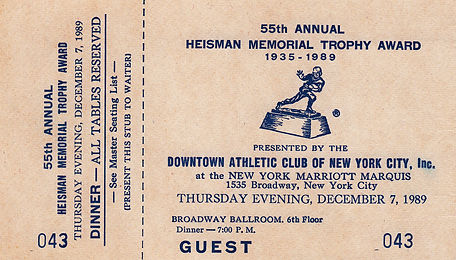
Heisman Trophy
Ticket Museum
This site is dedicated to the history of college football and its most coveted award...
The Heisman Memorial Trophy
which is presented annually to college football's most outstanding player.
The purpose of this site is to chronicle the college football season of every Heisman Memorial Trophy winner as illustrated through the beauty and artistry of game ticket stubs.
My goal is to collect a ticket stub, press pass, sideline pass, or any other form of entry to every regular season football game played during each Heisman Trophy winners Heisman Trophy winning season.
While I do prefer game ticket stubs over all other forms of entry, I will include others when I cannot find a ticket stub. I do add Bowl games and Playoff games, but they are not mandatory to the collection.
I am continually searching for the missing ticket stubs for this collection.
Please let me know if you have any of my needs available for sale or trade.
These missing tickets can be seen on each page identified with a "wanted" icon.
They can also be found in list form by clicking on the on the "TICKETS NEEDED" tab.
To date, I have acquired 860 of the 955 tickets (90%) necessary
to complete the collection between the years of 1935-2025.
Tickets beginning with the COVID-19 year of 2020 are very difficult to obtain as most schools and venues stopped printing tickets, instead going to digital formats.
I do not include any ticket from the COVID-19 year (2020) and going forward in the total
required for completion, unless I have obtained one and it as part of the collection.
That being said, on most occasion's they do exist in box office form.
I still try to obtain them when I am able to do so.
Please use the tabs below to view this collection by decade.
(for best viewing, I recommend using the desktop version, but a mobile version is also available)
I hope you enjoy this site as much as enjoy bringing it to you!
1980 George Rogers - South Carolina
The Duluth, Ga., native attended Duluth High and rushed for a still-standing school-record 2,286 yards as 1975 junior. He was highly-recruited as a senior and decided to attend South Carolina when coach Jim Carlen told him that he could play in his freshman year. Due to his large size — 6-2, 220 pounds — he seemed destined to play fullback rather than tailback. However, the Gamecocks had two running backs who graduated at the same time, so he began his college career as the starting tailback midway through his freshman season.
Rogers rushed for 623 yards as a freshman and then tallied 1,006 yards as a sophomore while splitting time with Johnnie Wright. However, it was Rogers’ junior campaign that launched him into the national spotlight, as he finished with 1,681 yards and eight touchdowns to earn All-American honors.

As a senior, Rogers ran his 100-yard rushing streak to 21 games, totaling a nation-best 1,781 yards while scoring 14 touchdowns. South Carolina finished 8-3 and earned a berth in the Gator Bowl. Rogers was a unanimous All-American selection. On December 1, 1980, George Rogers was awarded the Heisman Trophy. Rogers went on to become the first player chosen in the 1981 NFL draft and starred for the New Orleans Saints. In his first season, Rogers led the league in rushing with 1,674 yards, which set a record for rookies and is still the single season record for the Saints. He was selected as the NFL Rookie of the Year. to the Washington Redskins, where he helped lead his team to a Super Bowl Championship in 1988.
Rogers retired in 1988.
George Roger was elected to the College Football Hall of Fame in 1997.
George Washington Rogers Jr. (December 8, 1958)

9/6/1980 vs. Pacific (full ticket)
(W 37-0)
(attendance 56,211)

9/13/1980 vs. Wichita State (full ticket)
(W 73-0)
(attendance 55,761)

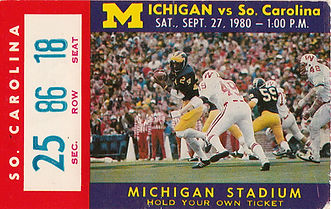
9/27/1980 at Michigan
(W 17-14)
(attendance 104,213)
9/20/1980 at U.S.C.
(L 13-23)
(attendance 58,385)

10/4/1980 vs. North Carolina State (full ticket)
(W 30-10)
(attendance 56,581)
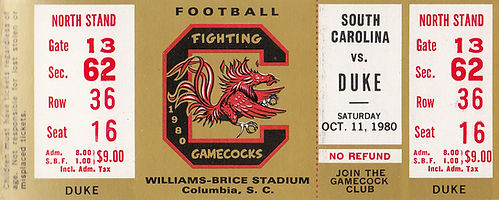
10/11/1980 vs. Duke (full ticket)
(W 20-7)
(attendance 56,451)

10/18/1980 vs. Cincinnati (full ticket)
(W 49-7)
(attendance 56,599)

11/8/1980 vs. The Citadel (full ticket)
(W 45-24)
(attendance 55,937)

11/1/1980 at Georgia (full ticket)
(L 10-13)
(attendance 62,200)
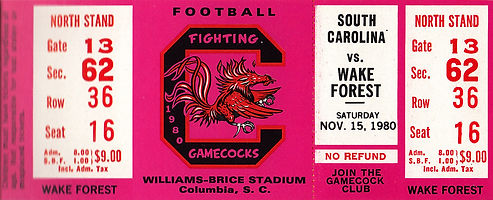
11/15/1980 vs. Wake Forest (full ticket)
(W 39-38)
(attendance 55,583)
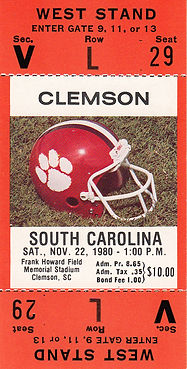
11/22/1980 at Clemson (full ticket)
(L 6-27)
(attendance 64,200)

1980 unused season ticket book

12/29/1980 vs. Pittsburgh
(L 9-37)
(attendance 72,287)
1981 Marcus Allen - USC
The 6-2, 210-pound Allen was born in San Diego, Calif., where he was an all-star quarterback and safety at Lincoln High. The highly-coveted recruit signed with USC in the spring of 1978 as a safety, but was moved to tailback that fall. As the backup to Charles White, he carried the ball 31 times for 171 yards as the Trojans won the 1978 national title. He was moved to the fullback spot in 1979 and Allen responded with 649 yards and eight touchdowns while playing the role of lead blocker for White’s Heisman bid. As a 1980 junior, Allen moved back to tailback and promptly rushed for 1,563 yards and 14 scores while leading the nation in all-purpose yardage. His senior season of 1981 was one of the greatest in Heisman history. He topped the 200-yard rushing mark in eight of 11 games and totaled 2,342 yards while scoring 23 touchdowns (while also catching 29 passes) as the Trojans finished 9-2 on the year.
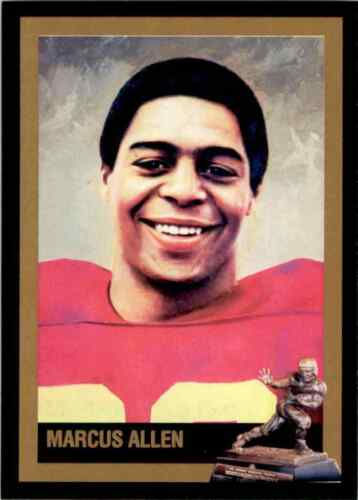
On December 5, 1981, Marcus Allen was awarded the Heisman Trophy. He would as win the Maxwell and Walter Camp player of the year awards. Allen became the fourth USC running back to win the Heisman while becoming the first player to rush for over 2,000 yards in a single season. He is arguably the most decorated player in the history of football as he is the only player to win a national title, a Heisman, a Super Bowl, a Super Bowl MVP award and an NFL regular-season MVP award.
Drafted with the 10th overall pick in the 1982 NFL draft's first round by the Oakland Raiders, Allen played professionally until 1997, when he retired from the Kansas City Chiefs. He was the MVP of the 1984 Super Bowl and the NFL’s MVP in 1985. He was elected into the Pro Football Hall of Fame in 2003.
Marcus Allen was elected into the College Football Hall of Fame in 1999.
Marcus LeMarr Allen (March 26, 1960)

9/12/1981 vs. Tennessee
(W 43-7)
(attendance 62,147)

9/19/1981 at Indiana
(W 21-0)
(attendance 51,167)

9/26/1981 vs. Oklahoma
(W 28-24)
(attendance 85,651)

10/3/1981 at Oregon State (full ticket)
(W 56-22)
(attendance 33,000)

10/10/1981 vs. Arizona (full ticket)
(L 10-13)
(attendance 56,315)

10/17/1981 vs. Stanford (full ticket)
(W 25-17)
(attendance 76,291)

10/24/1981 at Notre Dame
(W 14-7)
(attendance 59,075)

11/7/1981 at California
(W 21-3)
(attendance 74,000)
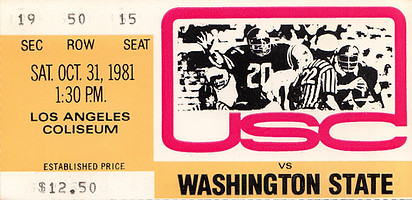
10/31/1981 vs. Washington State
(W 41-17)
(attendance 60,972)
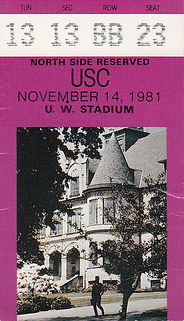
11/14/1981 vs. Washington
(L 3-13)
(attendance 47,347)
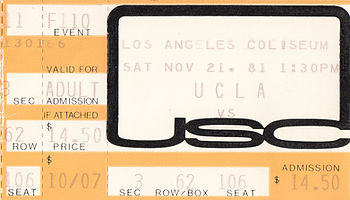
11/21/1981 vs. U.C.L.A.
(W 22-21)
(attendance 89,432)

12/10/1981 Heisman Trophy Presentation
V,I.P. Reception ticket

1/1/1982 vs. Penn State
(Fiesta Bowl)
(L 10-26)
(attendance 71,053)
1982 Herschel Walker - Georgia
Walker was born in Wrightsville, Ga., one of seven children. He attended Johnson County High, where he played football, basketball and competed in track. In his senior year of 1979, he rushed for 3,167 yards, helping the Trojans to win their first state championship. The valedictorian of his class, he was awarded the first Dial Award as the 1979 national high school scholar-athlete of the year. Of course Walker was coveted by schools all around the country, but he eventually chose his local team, the Georgia Bulldogs. His arrival in Athens was momentous, as he produced one of the great freshman seasons in college football history, rushing for 1,616 yards and 15 touchdowns as the Bulldogs went 12-0 and won the national title. Walker tied for the best finish ever (at the time) by a freshman in the Heisman vote, placing third behind George Rogers and Hugh Green.
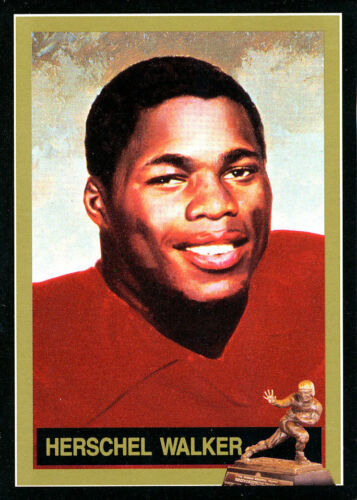
Herschel Junior Walker (March 3, 1962)
Walker and legends Glenn Davis and Doak Walker are the only players to log three top three Heisman finishes. As a junior, Walker rushed for 1,752 yards and 16 touchdowns while leading the Bulldogs to an 11-0 regular-season record and a national title matchup against Penn State in the Sugar Bowl. On December 4, 1982, Herschel Walker was awarded the Heisman Trophy. Following his junior season, Walker decided to go pro. The NFL still didn’t take underclassmen, but the newly-formed USFL did. Walker signed with the New Jersey Generals and became the marquee player in that league.In his three-year USFL career, Walker rushed for 5,562 yards. He later joined the NFL’s Dallas Cowboys, forming the league’s first all-Heisman backfield with Tony Dorsett. He also had stints with the Vikings, Eagles, and Giants before retiring in 1998.
Herschel Walker was elected into the College Football Hall of Fame in 1999.

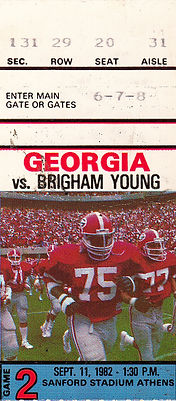
9/21/1981 vs. B.Y.U.
(W 17-14)
(attendance 80,207)
9/6/1982 vs. Clemson (full ticket)
(W 13-7)
(attendance 82,112)

10/21982 at Mississippi State (full ticket)
(W 29-22)
(attendance 33,158)

9/25/1982 at South Carolina
(W 34-18)
(attendance 74,200)

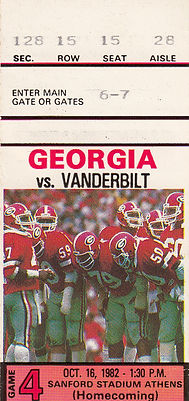
10/8/1982 vs. Ole Miss
(W 33-10)
(attendance 82,122)
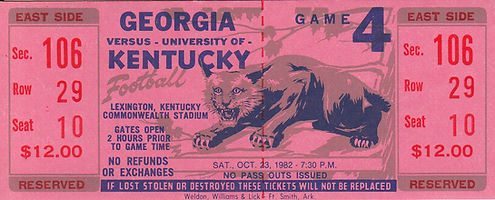
10/23/1982 at Kentucky (full ticket)
(W 27-14)
(attendance 56,697)
10/16/1982 vs. Vanderbilt
(W 27-13)
(attendance 82,122)
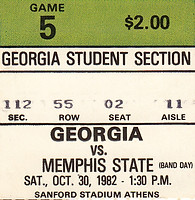
10/30/1982 vs. Memphis State (student section ticket)
(W 34-3)
(attendance 81,388)
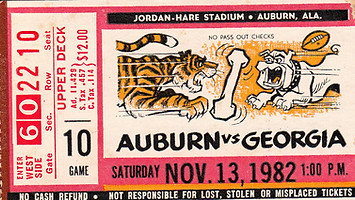
11/13/1982 at Auburn
(W 19-14)
(attendance 74,900)

11/6/1982 vs. Florida (Jacksonville, FL)
(W 44-0)
(attendance 80,749)
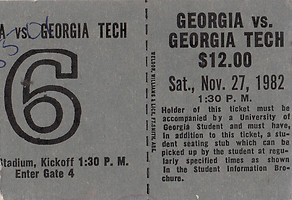
11/27/1982 vs. Georgia Tech (student ticket)
(W 38-18)
(attendance 82,122)
1983 Mike Rozier - Nebraska
Rozier was born in Camden, New Jersey. He was a sprinter and running back for Woodrow Wilson High in the late 1970s and smashed countless school records. Despite his gridiron heroics, he was not heavily recruited coming out of high school in 1980 and, anyway, his grades were not up to par. So he spent his freshman year at Coffeyville JC in Kansas, leading that team to a perfect 9-0 season.
With his academics in order, Rozier signed with Nebraska and spent his 1982 sophomore season as a backup to future NFL great Roger Craig, rushing for 943 yards and five touchdowns in the powerful Cornhusker attack. As a junior in 1982, Rozier set a school record with 1,689 yards to go with 15 touchdowns as Nebraska finished 12-1. Rozier finished 10th in the Heisman voting that year. Rozier completely destroyed Nebraska’s record books as a senior. He ran for 2,148 yards and 29 touchdowns, and averaged nearly 8 yards per carry.

He topped the 200-yard mark in each of his last four regular-season games. On December 5, 1983, Mike Rozier was awarded the Heisman Trophy. He easily won the Heisman over BYU's Steve Young. In addition to winning the Heisman, Rozier was also the recipient of the Maxwell Award, and was also named Walter Camp’s 1983 “Player of the Year”. That Nebraska team averaged 52 points a game, and earned a berth in the Orange Bowl, where they played Miami for the national championship but fell to the Hurricanes 31-31.. Rozier was the No. 1 draft pick and was chosen in the USFL by the Pittsburgh Maulers and then the Jacksonville Bulls before being chosen in the supplemental draft by the Houston Oilers in 1984, where he played for seven years. He finished his NFL career with the Atlanta Falcons in 1991.
Mike Rozier was elected into the College Football Hall of Fame in 2006.
Michael T. Rozier (March 1, 1961)
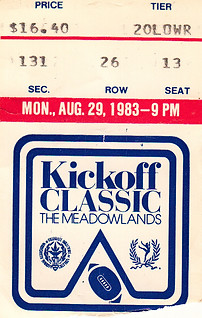

9/10/1983 vs. Wyoming
(W 56-20)
(attendance 76,016)
8/29/1983 vs. Penn State
(Kickoff Classic - The Meadowlands, NJ)
(W 44-6)
(attendance 71,123)

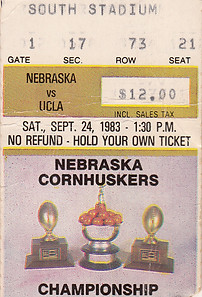
9/24/1983 vs. U.C.L.A.
(W 42-10)
(attendance 76,510)
9/17/1983 at Minnesota
(W 84-13)
(attendance 62,687)


10/8/1983 at Oklahoma State
(W 14-10)
(attendance 49,600)
10/1/1983 vs. Syracuse
(W 63-7)
(attendance 76,382)


10/22/1983 vs. Colorado
(W 69-19)
(attendance 76,268)
10/15/1983 at Missouri
(W 34-13)
(attendance 72,348)

10/29/1983 at Kansas State
(W 51-25)
(attendance 44,150)
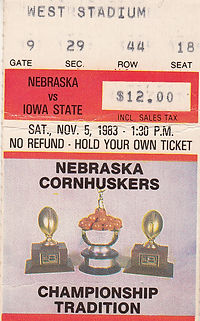
11/5/1983 vs. Iowa State
(W 72-29)
(attendance 76,326)
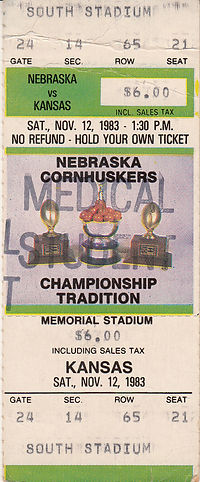
11/12/1983 vs. Kansas
(W 67-13)
(attendance 76,503)
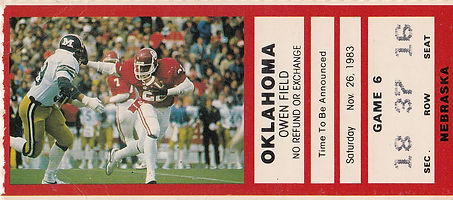
11/26/1983 at Oklahoma
(W 28-21)
(attendance 75,008)


12/8/1983 Heisman Trophy Presentation
V.I.P. Reception ticket
12/3/1983 Heisman Trophy
Announcement ticket
1984 Doug Flutie - Boston College

Flutie was born in Baltimore but moved to Natick, Massachusetts, as a teenager. He graduated Natick High in 1981 as an all-league performer in football, basketball and baseball.
He signed with Boston College and earned a starting role as a true freshman and never looked back, never missing a game in his career. That first year, he threw for 1,652 yards and 10 touchdowns. He totaled 2,749 yards and a sophomore and 2,724 yards as a junior as BC went 9-3 and won the Liberty Bowl. That year, Flutie was a Heisman finalist, finishing third in the vote behind Mike Rozier. He entered the 1984 season as one of Heisman front runners and didn’t disappoint.
Flutie had a remarkable senior year, throwing for 3,454 yards and 27 touchdowns as the Eagles finished 9-2 in the regular season and ranked eighth in the polls. Of course, everyone remembers his dramatic last-second bomb to Gerard Phelan that led BC over Miami, 47-45.
But contrary to popular belief, that play did not win Flutie the Heisman as the votes were already mailed in. On December 1, 1984, Doug Flutie was awarded the Heisman Trophy. A unanimous First-Team All-America selection in 1984, he won the Maxwell Award and the Davey O’Brien Award that year in addition to the Heisman. An excellent student, Flutie was also a candidate for a prestigious Rhodes Scholarship in his senior year.
After graduation, he played 22 years of professional football in the USFL the NFL, and the Canadian Football League, where he won multiple Grey Cup Championships. On November 17, 2006, Flutie was named the greatest Canadian Football League player of all time while In 2007, he was named to Canada's Sports Hall of Fame, the first non-Canadian to be inducted.
Doug Flutie was elected into the College Football Hall of Fame in 2007, hie first year of eligibility.
Douglas Richard Flutie (October 23, 1962)

9/1/1984 vs. Western Carolina
(W 44-24)
(attendance 32,000)

9/22/1984 vs. North Carolina
(W 52-20)
(attendance 44,672)

9/8/1984 at Alabama
(full ticket)
(W 38-31)
(attendance 67,821)

10/13/1984 vs. Temple
(W 24-10)
(attendance 32,000)
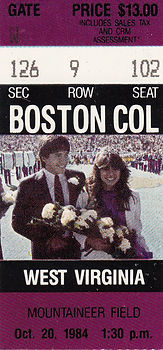
10/20/1984 at West Virginia
(L 20-21)
(attendance 60,286)



11/10/1984 vs. Army
(W 45-31)
(attendance 32,000)
11/3/1984 at Penn State
(L 30-37)
(attendance 85,690)
10/27/1984 vs. Rutgers
(full ticket)
(W 35-23)
(attendance 32,000)

11/17/1984 vs. Syracuse
(W 24-16)
(attendance 60,890)

11/24/1984 at Miami
(Hail Mary game)
(W 47-45)
(attendance 30,325)

12/1/1984 at Holy Cross
(full ticket)
(W 45-10)
(attendance 25,000)
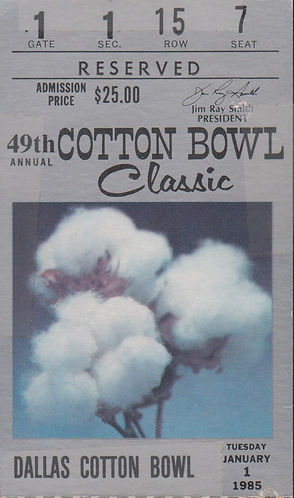
1/1/1985 vs. Houston Cougars
(Cotton Bowl)
(W 45-28)
(attendance 67,381)
1985 Bo Jackson - Auburn
Jackson, the eighth of ten children, was born and raised in Bessemer, Ala. The 6-2, 230-pounder attended McAdory High School in McCalla, where he attracted the interest of collegiate scouts from three sports: football, baseball, and track and field. In 1982, the New York Yankees drafted him out of high school, but Jackson rejected their contract offer and instead accepted a football scholarship from Auburn University. He made an immediate impact for the Tigers, rushing for 829 yards and nine touchdowns as a 1982 true freshman. He followed that up with 1,213 yards and 12 touchdowns — while averaging almost eight yards per carry — as a sophomore in 1983 as the Tigers went 11-1 and finished third in the polls. Injuries limited him to 475 yards and five scores in 1984.
Jackson was slowed by injuries as a senior as well, but he still managed to rush for 1,786 yards and 17 touchdowns as Auburn finished 8-3 on the season.
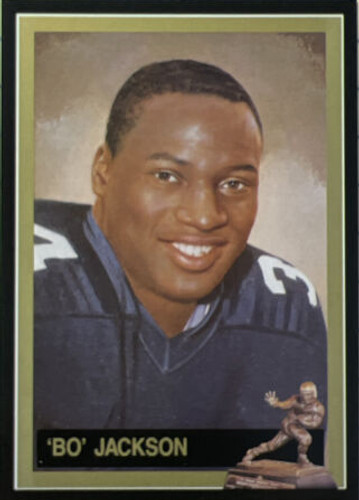
On December 7, 1985, Bo Jackson was awarded the Heisman Trophy. He was awarded the Heisman over Chuck Long of Iowa in what was, at the time, the closest vote in Heisman history. Jackson was selected with the first overall pick of the 1986 NFL Draft by the Tampa Bay Buccaneers, but he opted to play baseball for the Kansas City Royals, the defending World Series champions, who had drafted him in the fourth round in the 1986 amateur draft. He played several seasons with the Royals, White Sox and Angels, while also returning to football to play for the Los Angeles Raiders. He is the only professional athlete in history to be named an All-Star in both baseball and football. A 1991 hip injury on the field ended his football career, while after much rehabilitation and and unbelievable comeback, his baseball career ended in 1994.
Bo Jackson was elected into the College Football Hall of Fame in 1996.
Vincent Edward "Bo" Jackson (November 30, 1962)

9/7/1985 vs. South West Louisiana
(W 49-7)
(attendance 60,000)

9/14/1985 vs. Southern Mississippi
(W 29-18)
(attendance 63,000)


10/5/1985 vs. Mississippi
(W 41-0)
(attendance 67,500)
9/28/1985 at Tennessee
(L 20-38)
(attendance 94,358)
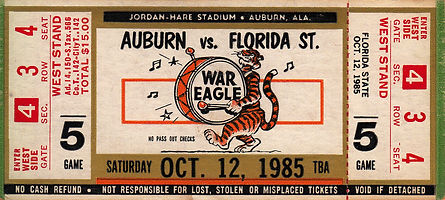
10/12/1985 vs. Florida State (full ticket)
(W 59-27)
(attendance 75,000)

10/19/1985 at Georgia Tech
(student section - temporary stands)
(W 17-14)
(attendance 57,501)

11/2/1985 vs. Florida
(L 10-14)
(attendance 75,000)

11/16/1985 at Georgia
(W 24-10)
(attendance 82,122)

10/19/1985 at Georgia Tech
(W 17-14)
(attendance 57,501)

10/26/1985 vs. Mississippi State
(W 21-9)
(attendance 68,700)

11/9/1985 vs. East Carolina
(W 35-10)
(attendance 65,600)
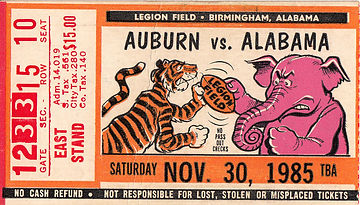
11/30/1985 vs. Alabama
(L 23-25)
(attendance 75,808)
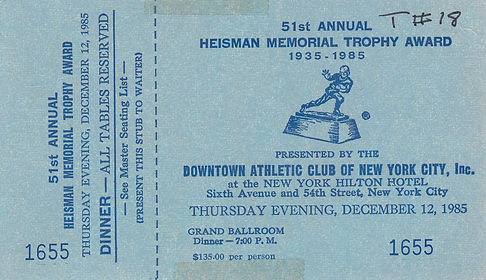
12/12/1985 Heisman Trophy Presentation ticket
1986 Vinny Testeverde - Miami
Born in Brooklyn, New York, Testaverde went to school at Sewanhaka High in Floral Park on Long Island, and graduated in 1981. He then went to Fork Union Military Academy in Fork Union, Virg., for a post-graduate year of college preparatory work (1995 Heisman winner Eddie George also attended Fork Union) before signing with Miami in 1982.
The quarterback depth his freshman year was remarkable and included Jim Kelly, Bernie Kosar and former Georgia head coach Mark Richt.
Testaverde threw for 79 yards in limited action as a 1982 true freshman and then redshirted in 1983 when Miami won the national title. He served as a backup to Kosar in 1984 before taking over the starting job as junior in 1985. Testaverde threw for 3,238 yards and 21 touchdowns that season and led Miami to a 10-2 record and a No. 9 final ranking.

His senior year was a magical one. Testaverde threw for 2,557 yards and 26 touchdowns (while also adding four rushing scores) as Miami finished the regular season 11-0 and ranked No. 1 in the country. On December 6, 1986, Vinny Testeverde was awarded the Heisman Trophy. Testaverde won the Heisman in a landslide over Temple’s Paul Palmer.
A loss to Penn State in the Fiesta Bowl cost the Hurricanes another national title, but it didn’t dim Testaverde’s star.
Tampa Bay selected Testaverde as the first overall pick of the 1987 NFL Draft. He finished his pro career with 46,233 yards passing and 275 touchdowns, both among the top eight on the NFL career charts at the time of his retirement.
He was inducted into the University of Miami Sports Hall of Fame in 1998.
Vinny Testeverde was elected into the College Football Hall of Fame in 2013.
Vincent Frank Testeverde Sr. (November 13, 1963)

8/31/1986 at South Carolina
(W 34-14)
(attendance 73,500)
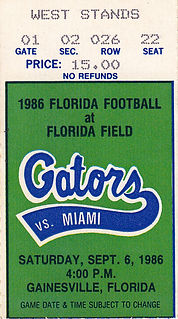
9/6/1986 at Florida
(W 23-15)
(attendance 74,875)

9/13/1986 vs. Texas Tech
(W 61-11)
(attendance 41,925)
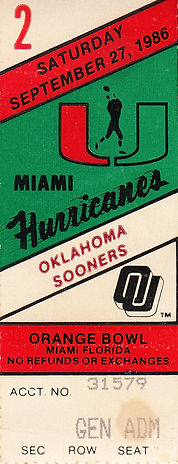
9/27/1986 vs. Oklahoma
(W 28-16)
(attendance 71,451)

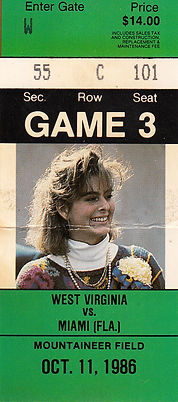
10/11/1986 at West Virginia
(W 58-14)
(attendance 63,500)
10/4/1986 vs. Northern Illinois
(W 34-0)
(attendance 33,905)
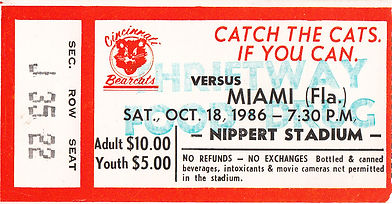
10/18/1986 at Cincinnati
(W 45-13)
(attendance 29,546)

11/1/1986 vs. Florida State (full ticket)
(W 41-23)
(attendance 62,834)
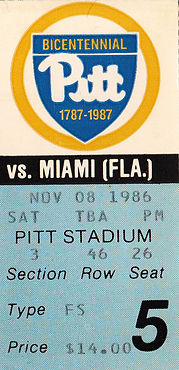

11/15/1986 vs. Tulsa
(W 23-10)
(attendance 51,110)

11/22/1986 vs. East Carolina
(W 36-10)
(attendance 30,202)
11/8/1986 at Pittsburgh
(W 37-10)
(attendance 55,338)
1987 Tim Brown - Notre Dame
A native of Dallas, Texas, Brown attended Woodrow Wilson High, the same school as 1938 Heisman Trophy winner Davey O’Brien. Brown was highly-sought after by college recruiters despite his team going 4-25-1 during his three years as a starter. Brown chose Notre Dame over Oklahoma, SMU, Nebraska and Iowa. “Touchdown Timmy” set the Irish freshman receiving record in 1984 with 28 catches for 340 yards and one score. As a sophomore he caught 25 passes for 397 yards and three TDs and started to flash his return ability while averaging 24 yards on kickoff returns (with one TD return). Brown had 45 catches for 910 yards and two kick return TDs as a junior. He burst onto the national scene with a scintillating season-ending performance in a come-from-behind upset of USC and his name was on Heisman voters’ minds heading his senior year.

Timothy Donell Brown (July 22, 1966)
He then used back-to-back punt returns for touchdowns in an early-season 1987 game against Michigan State to cement his Heisman bid. On December 5, 1987, Tim Brown was awarded the Heisman Trophy. Listed as a flanker, Brown utilized his ability as a pass receiver, rusher out of a full-house backfield and punt and kickoff returner to rank sixth nationally in all-purpose yardage as a senior (167.9). Brown finished his career as Notre Dame’s all-time leader in pass reception yards (2493) while also returning six kicks for touchdowns (three punts, three kickoffs). Despite constant double and triple coverage as a senior, he earned a reputation as perhaps the most dangerous player in college football. He went on to a 17 year NFL career with the Raiders and Buccaneers. Brown was selected for enshrinement in the Pro Football Hall of Fame in 2015. Tim Brown was elected into the College Football Hall of Fame in 2009.
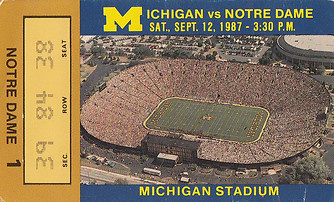
9/12/1987 at Michigan
(W 26-7)
(attendance 106,098)


9/19/1987 vs. Michigan State
(W 31-8)
(attendance 59,075)
9/26/1987 at Purdue
(W 44-20)
(attendance 68,528)
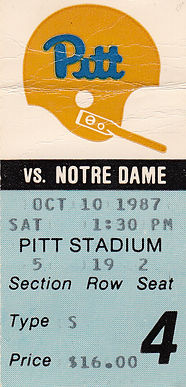
10/10/1987 at Pittsburgh
(L 22-30)
(attendance 56,400)

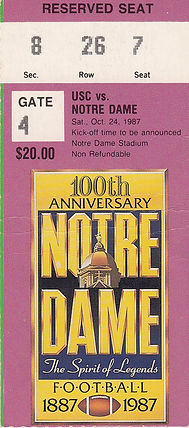
10/24/1987 vs. U.S.C.
(W 26-15)
(attendance 59,075)
10/17/1987 at Air Force
(W 35-14)
(attendance 51,112)
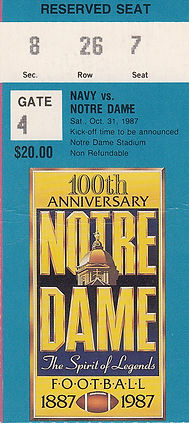
10/31/1987 vs. Navy
(W 56-13)
(attendance 59,075)

11/7/1987 vs. Boston College
(W 32-25)
(attendance 59,075)

11/14/1987 vs. Alabama
(W 37-6)
(attendance 59,075)
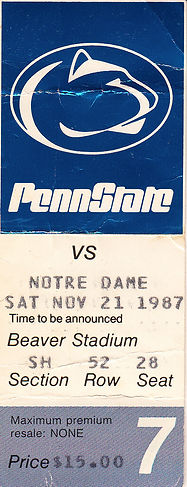
11/21/1987 at Penn State
(L 20-21)
(attendance
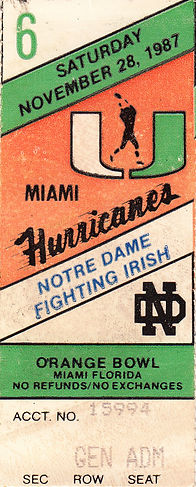
11/28/1987 at Miami
(L 0-24)
(attendance 76,640)
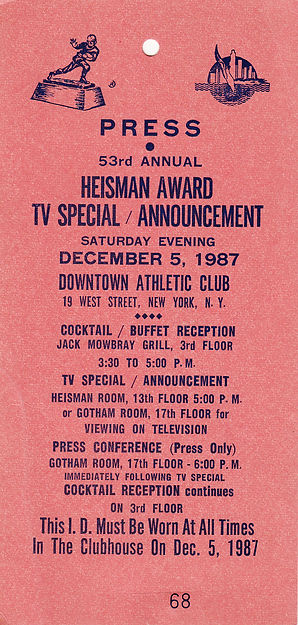
12/5/1987 Heisman Trophy Announcement Credential
1988 Barry Sanders - Oklahoma State
The 5-8, 200-pounder set 34 NCAA records in 1988 on his way to college football immortality.
Born in Wichita, Kansas, Sanders attended Wichita North High, where he did not become the starting tailback until the fourth game of his 1985 senior season. He rushed for 1,417 yards and averaged 10.2 yards per carry in the final seven games of the season, which earned him all-state honors. However, he was overlooked by most college recruiters and his only scholarship offers were from Emporia State, Tulsa and Oklahoma State.
Sanders chose the Cowboys and showed immediate promise as a 1986 freshman, rushing for 325 yards and two touchdowns while averaging 23.7 yards on kick returns. As a 1987 sophomore, he backed up future all-pro running back Thurman Thomas, rushing for 603 yards and nine touchdowns while leading the nation in kickoff returns with an average of 31.6 (to go with two return touchdowns).
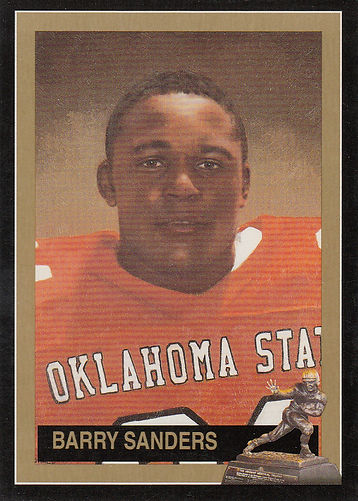
Barry David Sanders (July 16, 1968)
With Thomas off to the NFL, Sanders took over the starting running back spot in 1988 and proceeded to crank out a season for the ages. Sanders rushed for 2,628 yards, an average of 238.9 yards per game, with 37 rushing touchdowns. He also added a punt return TD and a kickoff return TD to bring his regular season touchdown total to 39. He produced a record 3,250 all-purpose yards and averaged 8.3 yards per play as Oklahoma State finished 9-2 and ranked 12th in the polls. On December 3, 1988, Barry Sanders was awarded the Heisman Trophy. Sanders won the Heisman by sweeping all six voting regions. He chose to skip his senior season in college and was drafted by the Detroit Lions with the third pick of the 1989 NFL Draft where he played for 10 seasons. He was enshrined in the Pro Football Hall of Fame in 2004.
Barry Sanders was elected into the College Football Hall of Fame in 2004.

9/10/1988 vs. Miami of Ohio
(W 52-10)
(attendance 43,200)

10/1/1988 vs. Tulsa
(W 56-35)
(attendance 45,100)

10/8/1988 at Colorado
(W 41-21)
(attendance 41,854)

9/24/1988 vs. Texas A&M
(W 52-15)
(attendance 50,440)

10/15/1988 at Nebraska
(L 42-63)
(attendance 76,432)
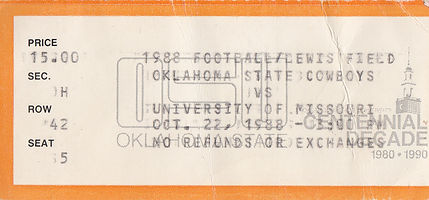
10/22/1988 at Missouri
(W 49-21)
(attendance 46,900)

10/29/1988 at Kansas State
(W 45-27)
(attendance 16,000)
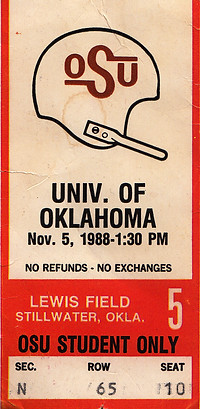
11/5/1988 vs. Oklahoma
(student ticket)
(L 28-31)
(attendance 50,440)

11/12/1988 vs. Kansas
(W 34-13)
(attendance 40,100)
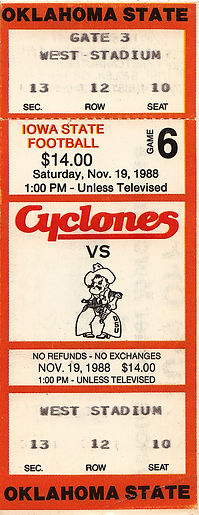

12/4/1988 vs. Texas Tech
(Tokyo Dome, Japan)
(W 45-42)
(attendance 56,000)
11/19/1988 at Iowa State
(W 54-7)
(attendance 38,163)

12/3/1988 Heisman Trophy Announcement Credential
1989 Andre Ware - Houston
Ware was born in Galveston, Texas, and attended nearby Dickinson High. Plenty of schools were willing to offer him a scholarship after his 1985 senior season, but not as a quarterback. Ware signed with Houston as a veer quarterback but was later ruled ineligible for his freshman season in 1986 so he attended Alvin Community College, working two jobs to help pay his tuition before joining the Cougars the following season. His arrival at Houston in 1987 coincided with the arrival of the run and shoot offense of new Cougars head coach Jack Pardee. As it turns out, Ware was custom-made for the system. However, he broke his arm five games into the season and was lost the rest of the way. Ware rebounded in 1988, earning the starting job and throwing for 2,507 yards and 25 touchdowns as the Cougars improved from 4-6-1 to 9-3. This excitement over this improvement was dampened a bit
as Houston was placed on NCAA
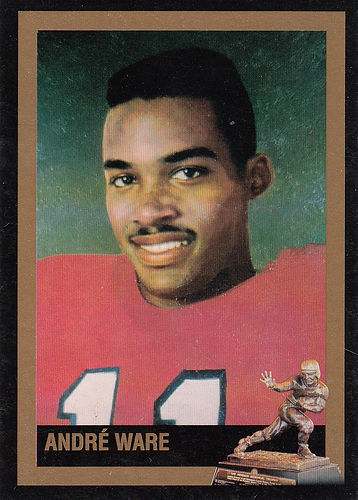
Andre Trevor Ware (July 31, 1968)
probation and banned from a bowl game for the 1989 season.
That didn’t stop Ware and the Cougars from producing one of the most explosive offenses in NCAA history. Ware threw for 4,699 yards and 46 touchdowns as Houston averaged 53.5 points per game. The list of accomplishments included a 95-21 drubbing of SMU, the most points ever scored by a team with a Heisman Trophy winner. All in all, Ware set 26 NCAA records as Houston finished 9-2 and ranked 14th nationally. On December 2, 1989, Andre Ware was awarded the Heisman Trophy.
Ware won Houston’s first Heisman by virtue of one of the great passing seasons in NCAA history. He remains the only player to win a Heisman for a team on NCAA probation. Ware declared for the NFL draft and was selected by Detroit with the seventh overall pick of the 1990 draft.
Andre Ware was elected into the College Football Hall of Fame in 2012.

9/2/1989 at U.N.L.V.
(W 69-0)
(attendance 22,416)


9/30/1989 vs. Temple
(W 65-7)
(attendance 15,121)
9/23/1989 at Arizona State
(W 36-7)
(attendance 67,357)

10/7/1989 vs. Baylor
(W 66-10)
(attendance 31,433)

10/14/1989 at Texas A&M
(L 13-17)
(attendance 66,423)

10/21/1989 vs. S.M.U.
(W 95-21)
(attendance 20,009)

10/28/1989 at Arkansas
(L 39-45)
(attendance 55,112)

11/4/1989 at T.C.U.
(W 55-10)
(attendance 19,212)
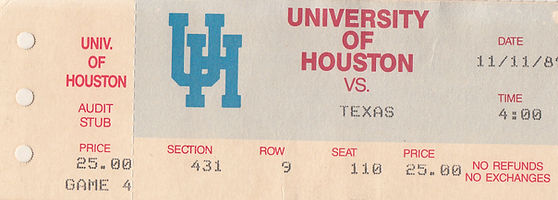
11/11/1989 vs. Texas
(W 47-9)
(attendance 45,586)

11/25/1989 vs. Texas Tech
(W 40-24)
(attendance 30,097)
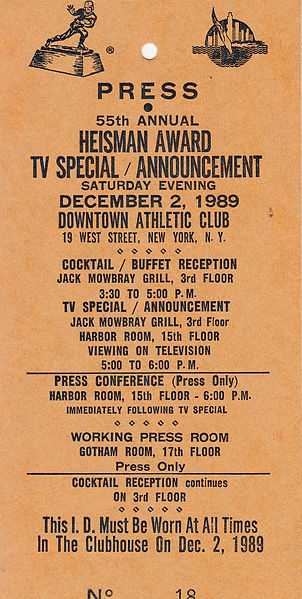
12/2/1989 Heisman Trophy
Announcement Credential

12/2/1989 at Rice
(W 64-0)
(attendance 22,700)

12/7/1989 Heisman Trophy Presentation ticket
